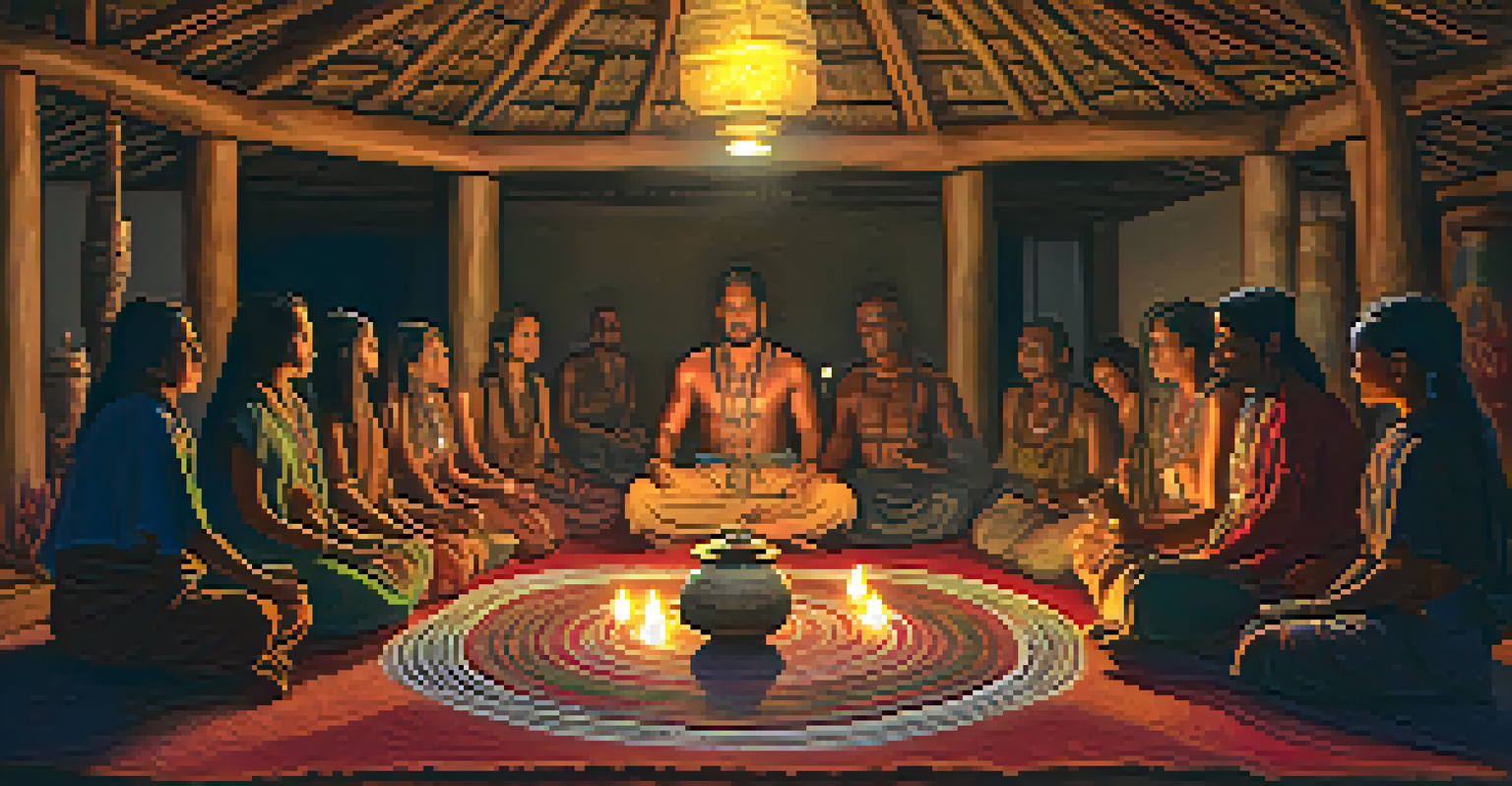Traditional Ayahuasca: Preserving Rituals in Modern Adaptations

Understanding Ayahuasca: A Journey Through Time
Ayahuasca is a powerful brew traditionally used by indigenous tribes in the Amazon. Its primary ingredients, the Banisteriopsis caapi vine and the Psychotria viridis leaf, create a profound psychedelic experience. For centuries, shamans have utilized this concoction to facilitate healing and spiritual connection. Understanding its historical context helps us appreciate its significance in various cultures and the reverence with which it's treated.
The plant teachers are not just about healing; they are about connection, community, and the spirit of the land.
The rituals surrounding Ayahuasca are deeply rooted in spirituality, often involving songs, chants, and communal gatherings. These practices are not just about the substance itself but also about the shared experience and the guidance of a shaman. In this way, Ayahuasca serves as a bridge between the material and spiritual worlds, fostering a sense of community and interconnectedness. This aspect is crucial to maintaining the integrity of the tradition as it adapts to modern times.
As we look at how these traditions are preserved, it's important to recognize the challenges faced by indigenous communities. The commercialization of Ayahuasca in the West has led to a surge in interest, but often at the expense of cultural authenticity. The balance between sharing these sacred practices and protecting their origins is a delicate one, requiring respect and sensitivity from all involved.
The Role of Shamans in Traditional Rituals
Shamans play an essential role in Ayahuasca ceremonies, acting as guides for participants. Their extensive knowledge of the brew, along with their spiritual training, allows them to navigate the complexities of each individual's journey. This guidance is crucial for ensuring a safe and meaningful experience, as Ayahuasca can invoke powerful emotional and psychological responses.

In traditional settings, a shaman's role extends beyond mere administration of the brew. They often lead rituals, sing Icaros (sacred songs), and create sacred spaces that facilitate healing. This holistic approach underscores the importance of the shaman's presence, as they provide not only physical guidance but also emotional and spiritual support. Their connection to the community and the spiritual realm is what makes these rituals profound.
Cultural Significance of Ayahuasca
Ayahuasca rituals are deeply rooted in indigenous spirituality and community, highlighting the importance of cultural context in understanding its use.
As Ayahuasca practices move into modern contexts, the role of shamans is being challenged and sometimes diluted. Western adaptations often lack the depth of traditional rituals, which can lead to misunderstandings about the essence of the experience. It’s vital to honor the wisdom of shamans and recognize their indispensable role in maintaining the authenticity of Ayahuasca rituals.
Modern Adaptations: Bridging Tradition and Change
In recent years, Ayahuasca has gained popularity outside of its traditional contexts, leading to various modern adaptations. These often include retreat centers and wellness programs that promise transformative experiences. While some of these adaptations aim to respect traditional practices, others risk commodifying the sacred aspects of the rituals.
In the end, we will conserve only what we love; we will love only what we understand; we will understand only what we are taught.
Modern adaptations can sometimes strip away the cultural significance and community aspects that are integral to traditional ceremonies. This can lead to a superficial understanding of Ayahuasca, reducing it to just another trend in wellness culture. However, some organizations strive to create a bridge between the old and new, offering education and context alongside the experience.
By integrating traditional knowledge with modern practices, it’s possible to create a respectful and enriching environment for participants. This approach not only honors the heritage of Ayahuasca but also allows individuals to explore its benefits in a contemporary setting. Such a balance is crucial for the preservation of rituals while making them accessible to a wider audience.
Cultural Preservation: Challenges and Opportunities
Cultural preservation is a pressing concern for indigenous communities as they navigate the modern world. The influx of outsiders seeking Ayahuasca experiences can lead to the dilution of their traditions and practices. Many are working hard to share their culture while protecting it from exploitation, which is a delicate balancing act.
One of the opportunities that arise from this challenge is the potential for cultural exchange. When approached with respect and understanding, modern interest in Ayahuasca can lead to greater awareness and appreciation of indigenous cultures. This can foster collaborations that benefit both parties, promoting preservation efforts and supporting local communities economically.
Role of Shamans in Ceremonies
Shamans provide essential guidance and support during Ayahuasca ceremonies, ensuring participants have safe and transformative experiences.
Nevertheless, it is essential that this cultural exchange does not come at the expense of authenticity. Indigenous leaders emphasize the importance of educating outsiders about the true significance of Ayahuasca rituals. By creating spaces for dialogue and understanding, we can help ensure that these traditions remain vibrant and respected for generations to come.
The Importance of Community in Ayahuasca Ceremonies
Community plays a significant role in Ayahuasca ceremonies, with shared experiences fostering connection and support among participants. Traditional rituals are often communal events, where individuals come together to embark on a collective journey of healing and transformation. This aspect of community can create a sense of belonging and shared purpose that enhances the overall experience.
In modern adaptations, the sense of community can sometimes be lost amidst commercialized settings. However, some retreat centers strive to recreate this communal atmosphere by encouraging group discussions and activities. This helps to build relationships among participants, allowing for deeper emotional connections and shared insights during the journey.
The power of community in Ayahuasca experiences cannot be overstated. Support from fellow participants often helps individuals navigate challenging moments during their journeys. This solidarity can lead to profound healing and growth, embodying the essence of what Ayahuasca rituals were originally intended to achieve.
Ethical Considerations in Ayahuasca Tourism
Ayahuasca tourism has raised several ethical considerations that require careful thought and discussion. As more people seek out these experiences, it's crucial to ensure that indigenous practices are respected and not exploited. This includes fair compensation for shamans and acknowledgment of the cultural significance of the rituals.
Additionally, there are concerns about the safety and well-being of participants in unregulated settings. Without the guidance of experienced shamans, newcomers may face risks that could lead to negative experiences. It is essential for those seeking Ayahuasca to research and choose reputable centers that prioritize safety and ethical practices.
Ethics of Ayahuasca Tourism
As interest in Ayahuasca grows, ethical considerations around cultural respect and participant safety are crucial for maintaining the integrity of traditional practices.
By addressing these ethical concerns, we can help create a more sustainable and respectful relationship between indigenous communities and those interested in Ayahuasca. This not only benefits the practitioners but also enriches the experiences of participants, ensuring that they engage with the traditions in a meaningful way.
Future Directions: Honoring Tradition in a Changing World
As Ayahuasca continues to gain recognition worldwide, the future will likely bring new challenges and opportunities for preserving traditional practices. Finding ways to honor the roots of Ayahuasca while allowing for modern adaptations is essential for its longevity. This requires open dialogue among indigenous communities, practitioners, and researchers.
Innovative approaches that incorporate both traditional wisdom and contemporary practices can lead to a richer understanding of Ayahuasca. This includes exploring how technology can facilitate education and access while respecting cultural heritage. As the conversation around Ayahuasca evolves, so too can the ways we engage with it.

Ultimately, the goal should be to create a respectful and enriching environment for all involved. By honoring the traditions of Ayahuasca while embracing modern adaptations, we can ensure that these rituals remain vibrant, meaningful, and accessible for future generations. This delicate balance is key to preserving the essence of Ayahuasca in a rapidly changing world.